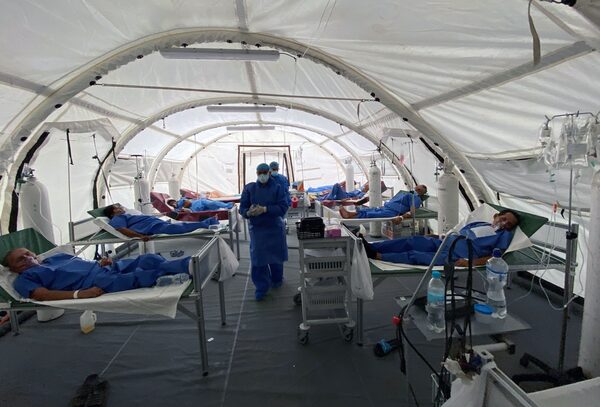
Patients are treated for COVID-19 at the field hospital of the IESS Hospital Los Ceibos, in Guayaquil, Ecuador, on April 13, 2020.ENRIQUE ORTIZ/AFP/Getty Images
Ecuadoreans who suffer chronic illnesses such as cancer and kidney failure are struggling to get treatment amid the coronavirus pandemic as basic supplies go short and hospitals suspend some services to reduce further infections, according to interviews with officials and relatives of patients.
The Andean nation’s COVID-19 outbreak has overwhelmed the health system, in some cases leaving authorities unable to collect the bodies of the deceased and forcing the government to temporarily store corpses in refrigerated shipping containers.
Ecuadoreans suffering kidney failure fear dialysis treatment centres will close for lack of supplies and because of coronavirus infections among patients and staff, particularly in the coastal city of Guayaquil, which has been the hardest hit.
“We are begging the government for help. Do not forget about us, please,” said Victoria Haro, 55, a housewife who has gone to numerous dialysis centres to get treatment for her 69-year-old sister.
Cristina Freire, a spokeswoman for the country’s dialysis treatment centres, on Tuesday said 100 people died over three weeks for lack of dialysis treatment, without offering details.
Reuters was unable to independently verify the statement.
Ecuador’s health and interior ministries did not respond to multiple requests for comment on the deaths.
Interior Minister Maria Paula Romo on Thursday said the government plans to begin home delivery of medicine needed by patients with chronic diseases, and to pay for private hospital treatment for those who are critically ill.
“We are working to provide health care to patients with other types of illnesses that are not COVID-19,” she said during a news conference.
Ecuador’s private health clinics have for months complained that the cash-strapped government owes them millions of dollars for unpaid services.
Guayaquil’s SOLCA cancer hospital, a private institution that receives support from non-profits, halted chemotherapy and radiation treatment for three weeks to prevent the spread of coronavirus, hospital medical director Guido Panchana said in an interview.
He said some cancer patients had died since the start of the epidemic, some in their homes, but declined to say how many.
Ecuador reported about 8,225 positive cases on Thursday, about 403 people dead and another 632 probable deaths from coronavirus in the country, according to official data.
Noris Arroyave, 31, spent weeks waiting in early-morning lines to fill an oxygen tank for her diabetic father – despite having tested positive herself for coronavirus. Her father contracted pneumonia and died at home.
“I am outraged that the government is so absent,” she added.
Author and journalist Malcolm Gladwell discusses the far-reaching impact of the coronavirus pandemic on refugees, conflict and the economy. Gladwell was in conversation with Rudyard Griffiths from the Munk Debates.
The Globe and Mail
Sign up for the Coronavirus Update newsletter to read the day’s essential coronavirus news, features and explainers written by Globe reporters and editors.